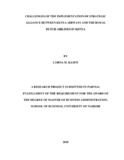| dc.contributor.author | Kasiti, Lorna M | |
| dc.date.accessioned | 2019-01-30T08:12:12Z | |
| dc.date.available | 2019-01-30T08:12:12Z | |
| dc.date.issued | 2018 | |
| dc.identifier.uri | http://hdl.handle.net/11295/105991 | |
| dc.description.abstract | This study was informed by the differential theory which premises on the varying
efficiency levels among firms as the main indicator of successful strategic alliances.
Towards this end, the differential theory argues that corporate managerial efficiency is the
key driver for strategic alliances. Adopting a case study research design, this study’s aim
was to investigate the main challenges facing the implementation of strategic alliance
between Kenya airways and the KLM Royal Dutch Airline. The study adopted a case study
research design and was guided by the following main objective; to establish the key
challenges facing the implementation of the strategic alliance between Kenya Airways and
KLM Royal Dutch Airline. Ten strategic managers were interviewed five from KLM and
a similar number from Kenya Airways. The procedure involved personal interviews to help
to determine the approaches to strategic alliance management practices and challenges
encountered during implementation. Qualitative data was obtained from the interview
guide and was analyzed using Content analysis. The study found out that: lack of partner
congruence; poor partner evaluation; blending of corporate culture; lack of clear
performance measures; absence of coordinated commitment; and lack of strategic fit are
the main categories of challenges facing successful implementation of strategic alliance
between Kenya Airways and the Royal Dutch Airline. The study concludes that; the
implementation of the strategic alliance between Kenya Airways and the Royal Dutch
Airline has not been successful due to a number of implementation challenges ranging from
blending of corporate culture; lack of clear performance measures; absence of coordinated
commitment to lack of strategic fit. The study recommends that other firms not only in the
aviation sector but across other sectors embrace best practice and dynamic capability
approaches in the management of strategic alliances to enjoy the benefits of such ventures,
while mitigating the failure of strategic alliance. The study further recommends that airline
firms in Kenya put in place critical success factors to create an enabling environment for
successful implementation of strategic alliances. And to ensure that the necessary practices
and mutual goals and objectives are identified and evaluated before implementation while
mitigating the impact of any obstacle that would impede strategic partners from achieving
the respective overall strategic alliance goals and objectives. The study was limited in
methodology given that a case study research design was adopted making the study less
generalizable. According to the study, further research efforts should focus on establishing
the enabling conditions for successful implementation of strategic alliances beyond the
airline sector. In addition, there is need for future studies to test and confirm the model so
established. | en_US |
| dc.language.iso | en | en_US |
| dc.publisher | University of Nairobi | en_US |
| dc.rights | Attribution-NonCommercial-NoDerivs 3.0 United States | * |
| dc.rights.uri | http://creativecommons.org/licenses/by-nc-nd/3.0/us/ | * |
| dc.subject | Alliance Between Kenya Airways And The Royal Dutch Airlines In Kenya | en_US |
| dc.title | Challenges Of The Implementation Of Strategic Alliance Between Kenya Airways And The Royal Dutch Airlines In Kenya | en_US |
| dc.type | Thesis | en_US |



